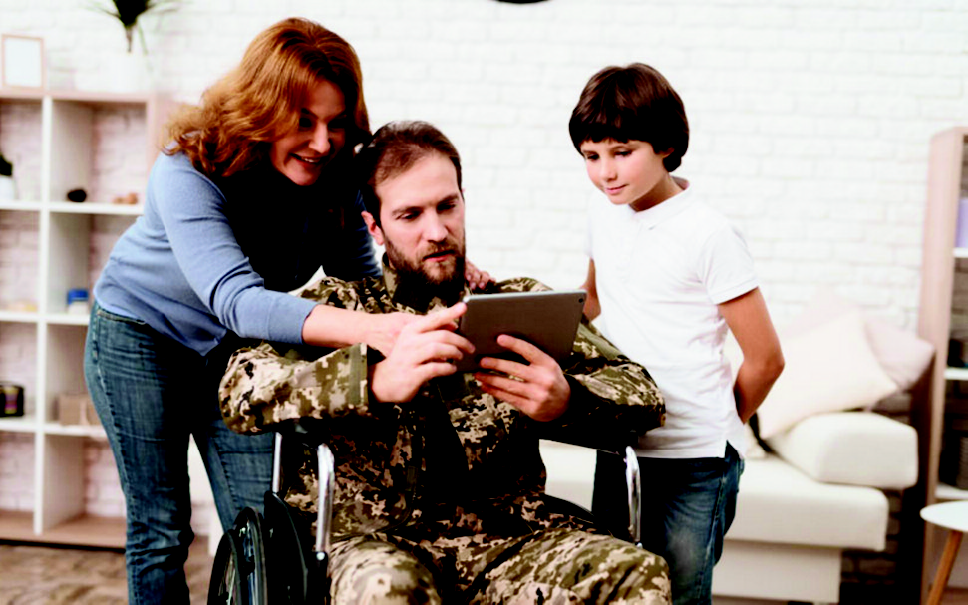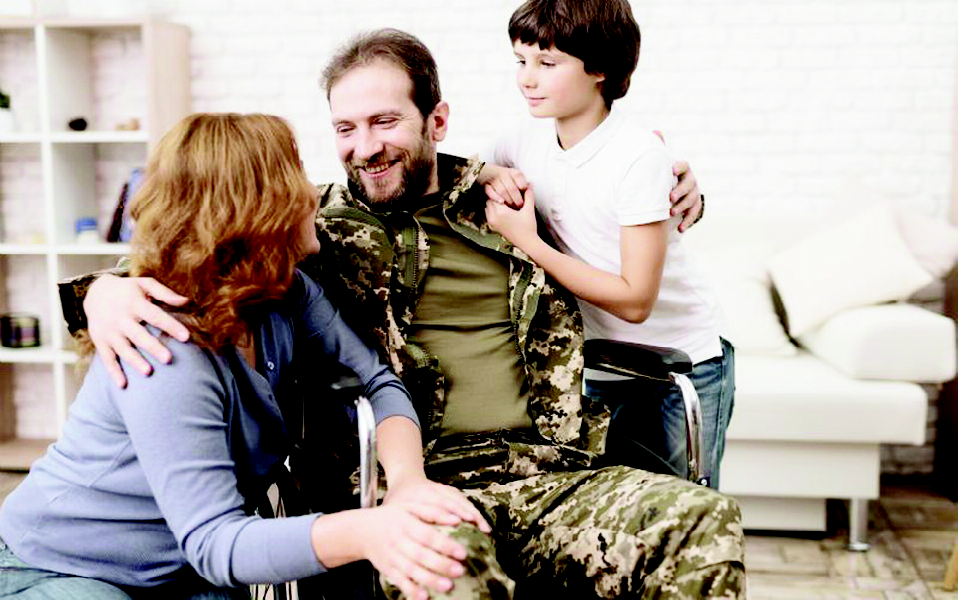BECOMING A CAREGIVER FOR A WOUNDED, ILL OR INJURED SERVICE MEMBER
W hen your spouse or loved one suffers a severe injury or debilitating illness, it can feel as if your entire world has been turned upside down — and the goals and plans you had for yourself, your marriage and your family go on hold.
W hen your spouse or loved one suffers a severe injury or debilitating illness, it can feel as if your entire world has been turned upside down — and the goals and plans you had for yourself, your marriage and your family go on hold. Your role is changing, and you're about to become part of your loved one's caregiving and recovery team. Remember, you have help (militaryonesource.mil/caregivers-benefits) and resources (warriorcare.dodlive.mil/files/2017/04/2860_Caregiver-Resource-Directory-2017_v- 2-508-Compliance.pdf) available. Learn all you can and reach out for all the support there for you.
BECOMING AN ACTIVE MEMBER OF THE RECOVERY TEAM
Educate yourself. As a caretaker, you are an extremely important part of your loved one's recovery team. You know them better than any doctor or nurse, and may notice things they do not. As a key advocate for your loved one's health, educating yourself about their condition will enable you to ask health care providers the right questions and help you anticipate your loved one's needs.
Get organized about care and treatment. Military OneSource's Keeping It All Together notebook is a helpful way to organize your wounded warrior's treatment and recovery in one place. Read about other resources to help here: militaryonesource.mil/caregivers-resources
Watch for depression or combat stress. While these are often symptoms of a physical injury and/or illness, they have the potential to become a longer-term mental health concern. You may notice angry outbursts, being easily startled, loss of confidence, loss of interest in life, mounting sadness, and risky behavior – and may take weeks or months to surface. Be sure to communicate all worrisome behavior to your loved one's doctor.
TAKING CARE OF YOURSELF AND YOUR CHILDREN
Caring for you. Allow yourself time to accept the changes in your life and relationship; be aware of the emotional and physical strains of caregiving. Grief, anxiety, isolation, fear, anger and even guilt are all common responses to this life change. While you may be consumed with helping your loved one, don't forget your well-being is also an important part of their recovery. If you take care of yourself, you are better able to care for them. Connecting with other caregivers can provide muchneeded support as well as some insight into ways to live with your situation.
The Military Caregiver PEER Forum Initiative (warriorcare.dodlive.mil/peer-2-peer-forum) offers the opportunity for caregivers to share knowledge, expertise, resources and ongoing support. Read more on Military OneSource about caregiver stress (next page) and find caregiver resources militaryonesource.mil/-/caregiver-support-resources-for-you-and-your-loved-one. Caring for your children. Helping children cope with a parent's wound, injury or illness often depends on the child's age and ability to understand the situation. How a child reacts to this "new normal" will vary, but there are a few strategies you can use to help them cope:
• Tell your child that it's normal to feel angry or sad. • Encourage your child to express his or her feelings through drawing, playing or writing. But don't force your child to talk about feelings. • Maintain routines. Even if your child is staying with a friend or adult while you are helping your injured service member, write down your child's routines and ask the caregiver to follow them. • When your child wants to talk, give them your full attention.
Finally, remember that Military OneSource and Child and Youth Behavioral Military Family and Life Counselors (military- onesource.mil/non-medical-counseling) are available to help you and your children with non-medical counseling. Contact Military OneSource counselors through Confidential Help on this website. For children and youth, ask if there are counselors at these locations near you: • Child development centers • Installation-based youth and teen centers • On- and off-installation public schools • Department of Defense Education Activity schools. Remember, becoming a caregiver presents a unique set of challenges. It isn't easy, but when you reach out for the right help and the right resources, you can make it work – for yourself, for your children, and your loved one.

HOW TO DEAL WITH STRESS AS A CAREGIVER
It's hard to avoid stress when you're caring for a loved one with a serious injury or an ongoing wound or illness. Caregiving is an important job that can be extremely demanding. Remember, as a caregiver, managing your stress is one of the best ways to ensure you're able to stay strong and resilient, and care for your loved one. Pay attention to your body and your moods and find time for yourself. You need it and you deserve it.
PREVENTING COMPASSION FATIGUE
Over time, the stress of caring for another person can cause something called "compassion fatigue." This is a common condition that can make you feel irritable, isolated, depressed, angry or anxious. It can even disturb your sleep and impair your judgment. Compassion fatigue can come on suddenly or build gradually over time, so it's important to check in with yourself regularly to note how you are feeling. MoodHacker (militaryonesource.mil/-/improve-your-mood-with-moodhacker) is a resilience tool that helps you track, understand and improve your mood. Since relationships and stress often drive our level of satisfaction in life, this mobile solution can get you headed in the right direction. Left untreated, compassion fatigue can lead to burnout and other conditions that may not go away on their own.
BUILD A SUPPORT NETWORK
As a caregiver, having people you can count on when times get tough and you need backup can be invaluable. Here are a few tips for building a strong support network: • Stay connected to your community. Your community can be your installation, neighborhood, religious community, co-workers or even just a group of close friends. This community can give you a built-in network of local support when you need it most.
• Join a support group. When you have struggles, sharing them with people who are in a similar situation can help you feel less isolated. People who understand may also be able to share new ideas and connect you with additional resources (warriorcare.dodlive.mil/files/2017/04/2860_Caregiver-Resource-Directory- 2017_v-2-508-Compliance.pdf). The Peer 2 Peer Forum (warriorcare.dodlive.mil/peer-2-peer-forum) also provides the opportunity for caregivers to share knowledge, expertise, resources and ongoing support.
• Seek out counseling. Talking with someone can sometimes help problems seem smaller and more manageable. Military OneSource offers confidential non-medical counseling (militaryonesource.mil/non-medical-counseling) — at no cost to you — in person, over the phone, by video or online.
• Be there for others. Reach out to people in similar situations. A sympathetic ear can work wonders to relieve stress, and you can develop relationships that allow you to lean on each other.
MANAGING STRESS
The key to resilience amidst the challenges of caregiving is to be mindful of your own emotional and physical health. • Exercise and eat a balanced diet. Physical strength and health directly relate to your mental and emotional health. Connect with real-live coaching experts right on your phone or tablet with this resilience tool, CoachHub (mil- itaryonesource.mil/-/coachhub-a-mobile-coach-for-your-life). Track and set goals from exercise and nutrition to stress reduction.
• Take a few moments each day just for you. Make it a priority to do something just for you as often as you can. Try this simple Chill Drill (militaryonesource.mil/products#!/detail/55) designed by a therapist specializing in working with service members and their families to help reverse the symptoms of stress.
• Resist feelings of guilt. If taking time for yourself sparks feelings of guilt, remind yourself that you can only provide care when you're doing well yourself.
• Say "yes" when someone offers assistance. Don't be shy about accepting help. Allow others to feel good about supporting you and your loved one. Accepting help is an act of strength, not weakness.
• Embrace a hobby. Doing something you love like painting, hiking, swimming or scrapbooking — no matter how little time you can spend — boosts your feelings of well-being. You may feel that whatever stress or difficulty you are going through isn't important compared to the struggles of your loved one; however, caring for yourself is the first step providing the support your loved one needs in the days to come.
Free and confidential non-medical counseling is available through Military OneSource. Call 800-342-9647 at any time. OCONUS/International? If you need immediate help or are experiencing a crisis, contact the Military Crisis Line (veter- anscrisisline.net/ActiveDuty.aspx) (1-800-273-8255 and Press 1). •
